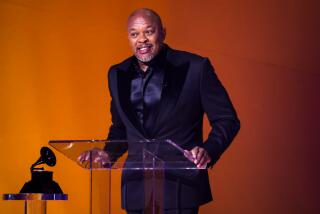Billy Clubbed : Brain-Damaged Man Wins $2.7-Million Award
- Share via
Walter Hodge was an outgoing young man with a good job on the summer night in 1976 that he emerged from a bar in Venice. He had been called to fetch his drunken girlfriend and happened onto the scene of a bloody scuffle between plainclothes Los Angeles police officers and another couple.
As eyewitnesses would later recount, one of the officers ran toward the startled Hodge and demanded that he release the sobbing woman he was pulling toward his car. Judy Traband, an emergency room supervisor who watched the first scuffle from her apartment balcony, remembers thinking, “Buddy, did you show up at the wrong moment.”
Haunting Thought
It was a thought that would haunt her years later.
When Hodge, then 29 and a commercial painter, awoke on a cement floor in a downtown jail ward two days later, he had a two-inch gash on his head and was unable to speak.
Now 41, he has permanent brain damage. Wracked by searing headaches that send him reeling to the ground in pain, he stutters severely and cannot concentrate long enough to cook a simple meal, read a page in one of his beloved books, or hold the most menial of jobs.
Last month, more than 11 years after the incident, Hodge was awarded $2.7 million--not from the police, but from his original attorneys, whom he sued for malpractice.
Police said Hodge was struck twice on the head with a billy club after he challenged Officer Dexter Owens with a knife. However, four eyewitnesses--none of whom knew Hodge--said his hands were empty. Witnesses said that after being struck, Hodge slumped to the ground and Owens raised his club a third time, delivering a heavy blow against Hodge’s skull.
But, in a bizarre legal twist, Owens was never brought to trial because Hodge’s attorney switched jobs and forgot to serve Hodge’s battery complaint. Perplexed over why his trial had not begun, Hodge in 1982 hired a new attorney, who discovered that the original law firm did not even know who Hodge was.
Because of that law firm’s error, Owens, now a detective in Southeast Division, will never be held to answer for a battery charge that is too old to pursue. Under law, Hodge’s attorneys were required to serve Owens and the Police Department within three years of filing the battery complaint.
On Nov. 17, Hodge won a long-sought moral victory when a Santa Monica Superior Court jury awarded him $2.7 million, to be paid by the firm of Cadoo, Tretheway, McGinn & Morgan.
During the 4 1/2-week trial, the firm admitted negligence in handling Hodge’s complaint, the file for which disappeared and was never found. But, the firm attempted to discredit his claim, arguing that the brain damage was linked to his heavy use of brandy since the injury. Rejecting that argument, the jury found that Officer Owens committed battery and was 100% responsible for Hodge’s injuries.
Traband, who testified about what she witnessed on that long-ago summer night, said in an interview that she is “still afraid, to this day, of the police, even though as an emergency room supervisor I have many friends who are police. But after what I saw, I was deathly afraid--just deathly afraid--of the police for a long, long time.”
‘Zero Effect’
Police officials said last week that the jury’s finding “will have zero effect” on Owens’ standing as a detective because it was made in a civil court.
“A civil jury only has to find a preponderance of evidence against him, where a criminal jury has to be convinced beyond a reasonable doubt,” said Officer Bill Collins of the LAPD’s legal unit. “To us, a finding in a civil court does not mean it’s true.”
The department refused to say whether Owens was ever reprimanded for the Hodge incident, and Owens could not be reached for comment.
In 1976, however, the city backed Owens when the district attorney charged Hodge with assault with a deadly weapon. The key evidence at the trial was a painter’s knife, worn by Hodge in a sheath on his belt; it was found on the ground after he was beaten. The jury deadlocked in favor of Hodge’s acquittal, and the charge was dropped.
Hodge’s attorney, Robert Erwin, said that although last month’s victory was a badly needed emotional boost for the troubled Hodge, as an attorney he “will never feel right that the officer gets off scot-free.”
Hodge will need lifelong neurological therapy. He has been living in a broken-down van on the streets of Culver City, showering at the homes of acquaintances. Most of his friends from happier times are long gone.
“He can’t even cook his own breakfast,” Erwin said, “because his mind will shift and he’ll mentally drift away, and by the time he gets back he’ll be stunned to find his breakfast has burned. It’s like some big practical joke you keep hoping will end.”
Affable, even charming, Hodge has befriended homeless people who live beneath the freeway ramps, spending hours helping them build cardboard shelters and, Erwin said, “perhaps feeling more comfortable” among those whose problems seem more akin to his own.
But children have cruelly attacked him in the neighborhood where he parks his van. And, because Hodge’s ability to use judgment is highly impaired, he is constantly getting into odd predicaments and minor scrapes with the law, Erwin said.
Tussle With Police
Two years ago, he got into a tussle with police after a kerosene lamp in his van caught some papers on fire, and police officers discovered him throwing burning items into the street.
Last May, when his mother was dying of cancer in a nursing home, he was arrested for trying to remove her from the facility to take her to a cancer specialist.
“How he managed to set up an appointment with a cancer specialist, I will never know,” Erwin said, “but I had this image of Walter pushing his bedridden mother up Westwood Boulevard, and that’s probably about what he had in mind.”
“That’s Walter’s life since the brain damage,” Erwin said. “He never hurts anybody, but he always gets hurts.”
On a recent day, a grinning Hodge gave a visitor a bunch of colorful flowers--rhododendrons and calla lilies--that had clearly been snatched from someone’s garden.
‘Does Goofy Things’
‘He does goofy things without realizing it, and then he’s terribly embarrassed,” Erwin said. “He’ll get all dressed up in a suit and go out for a job as a gas station attendant, or he’ll go to the market to get a can of tuna and he’ll pile the whole cart up without knowing why.”
Somehow, Hodge has learned to joke about his shortcomings.
“I am a great starter of things,” he said haltingly, repeating each word several times. “All I need is a finisher.”
Those who knew him before he was injured said he was a generous, outgoing friend who had planned to start his own commercial painting company. Today, living on $550 a month in disability support, friends said, he still gives money away to the poor.
“My husband and I got married very young, and if we were short on the rent, Walter insisted on helping and wouldn’t hear about being paid back,” said a friend, Michelene Scourfield.
A Trusted Friend
“He was a really friendly, normal guy who had backyard barbecues, an ex-wife and two kids,” she said. “I remember how we trusted him to baby sit our first child when it was only about 10 days old.”
About a month after Hodge was beaten, Scourfield invited him to her home.
“The change in him was just unbelievable,” she said. “It was not the same Ray. His swollen head got better later, of course, but his stuttering and his embarrassment got so bad that he felt he was a burden to even his closest friends.”
Hodge has two grown children who live in Tennessee, but he has seen them only once since the incident, keeping in touch by phone. “I have talked to them since the verdict,” he said slowly, “and they said I was their father and they love me no matter what happens.”
Scourfield said Hodge has grown increasingly withdrawn because he “knows what is wrong with him, and that is agonizing to him, because he is still intelligent--he is still quite with us.”
Long-Term Therapy
While medical experts say Hodge’s brain damage has not affected his intelligence, they believe that only long-term therapy can help overcome the behavioral problems that prevent him from holding a job or having a normal conversation.
Dr. Monte Buchsbaum of the department of psychiatry and human behavior at the University of California, Irvine, testified at the trial that a positron emission tomography, or PET scan, performed in April revealed that Hodge has lost 10% of the use of the frontal lobe portion of his brain, just below his two-inch scar.
He said the damage occurred in an area that affects “paying attention and the organization and planning of behavior.”
Dr. Charles Furst, a neuropsychologist from the New Pathways program at Daniel Freeman Memorial Hospital who testified at the trial, said people with frontal brain damage can be helped by intensive therapy to train them to anticipate their inappropriate behavior.
“The theory on the frontal lobe is that it is the executive of the brain that organizes and guides behavior by a series of commands--almost an inner speech that occurs so rapidly we don’t hear or notice it,” Furst said in an interview.
When a brain injury disrupts that inner voice for several years, Furst said, the victim is beset with “horrendous psychological problems that can be even worse than the brain injury itself.”
Erwin said Hodge hopes to enroll in the New Pathways program, using the $2.7-million award, with which he also plans to buy a home. However, the money will not be paid out for months--and perhaps for as long as two years--because of post-trial motions by Cadoo, Tretheway, McGinn & Morgan.
Steven Levy, an attorney who represented the law firm in the malpractice case, filed a motion for a new trial on Friday. Levy refused to comment on the case, saying only that the $2.7-million decision “is by no means final.”
Whatever the amount ultimately paid out, medical experts familiar with the case say Walter Hodge can never be made whole again.
And yet, when asked whether he blames anyone for his ruined life, Hodge names no one, saying only that if he had one wish it would be “to make the headaches go away.”
If that could happen, Hodge would have one final wish.
“I’d like to be able to finish one thing that I start,” he said in his strange, stuttering cadence. “I don’t know if I’ll get better, but I sure hope so.”
More to Read
Sign up for Essential California
The most important California stories and recommendations in your inbox every morning.
You may occasionally receive promotional content from the Los Angeles Times.













